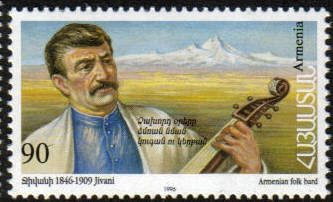Jivani was perhaps the last great name in the old Armenian tradition of the wandering ashughs (troubadours) in the late nineteenth century, both poet and musician.
He was born Serovbe Benkoyan (later Levonian) in 1846, in Kartzakh, near Akhalkalak, in Javakhk. He became an orphan when he was eight-years-old and his uncle looked after him and his two brothers. He had just learned the first letter at the village school, when he had to drop school and become a cowherd. He learned musical composition and performance on kemancha and violin with master Ghara-Ghazar over five years and earned his pseudonym Jivani. In 1866, along with troubadour Sazain, Jivani moved to Tiflis (nowadays Tbilisi), where he continued his musical activities. His artistic development is connected to Alexandropol (nowadays Gyumri) and its musical culture, where he lived and worked between 1868 and 1895. In Alexandropol, he headed a circle of fellow singers and was awarded the honorary title of ustabashi (leading master). He led his own group in 1871 and performed at the coffee shop of the Daloyan brothers. The next year, he married Hovhannes Daloyan’s daughter Ashkhen. They had six children, two of whom were noted editor, philologist, and art historian Garegin Levonian (1872-1947), and political activist Paruyr Levonian (1884-1933).
Jivani gave concerts all over Transcaucasia, including Batum, Baku, Kars, and Tiflis, where he returned in 1895. However, his fame was not enough to ensure the well-being of his family. He traveled to Plovdiv (Bulgaria) and then to Vienna, trying to improve his poor sight, between 1896 and 1900, but without success.
He published three compilations of poems in 1882, 1886, and 1893. He was the author of more than 800 songs, written in romantic, ironic, or realistic styles. Despite his lack of formal education, he managed to obtain a good knowledge of Armenian literature and was influenced by it. His songs were mainly devoted to the problems of social protest, poverty, and lawlessness. Jivani condemned oppressors, presented the struggle of the Armenians against foreign rule, and sang about the fraternity of people. Many of his songs became popular and are interpreted until now. His music has been performed or used by composers like Kristapor Kara-Murza, Gomidas Vartabed and Aram Khachaturian and many others.
Jivani passed away on March 5, 1909. A school of ashughs named after him functions in Yerevan, and there are streets bearing his name in Yerevan, Gyumri, and other cities.

